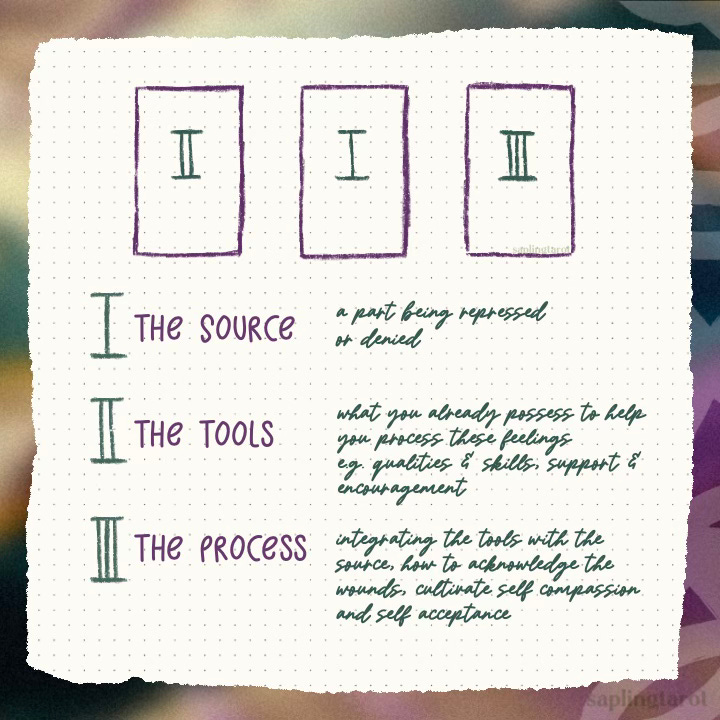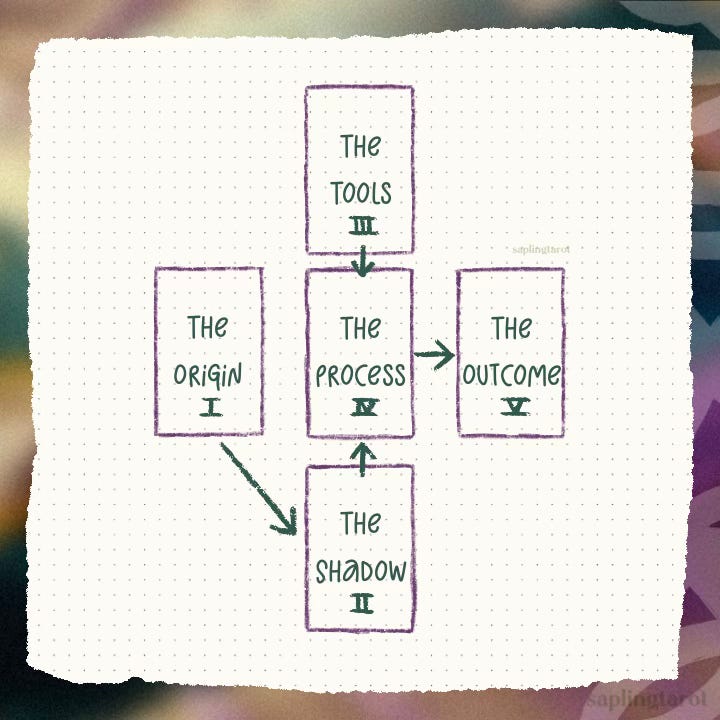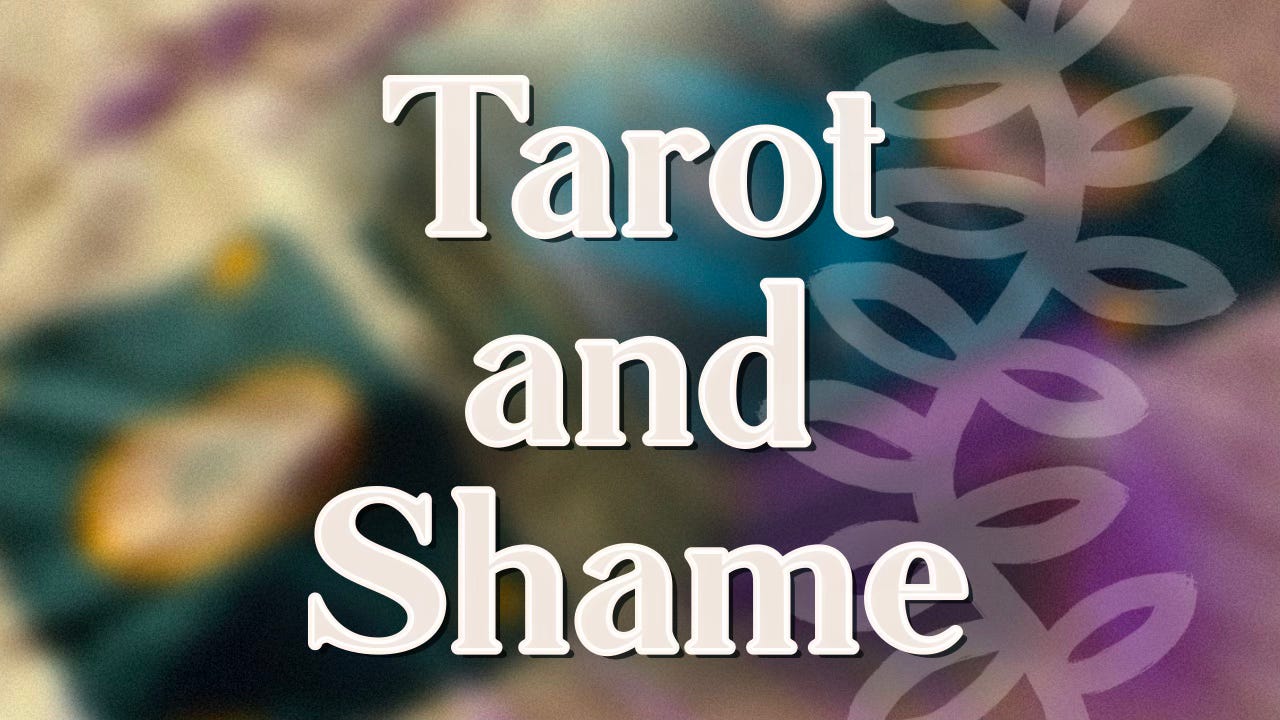Shame is a pervasive emotion that can profoundly affect our relationship with tarot and spiritual practices. By exploring where shame can arise and how to navigate it, we can create a more supportive and empowering environment for ourselves and all our fellow practitioners.
The topics I want to cover are not exhaustive, as we all have different relationships with tarot. Still, I want to touch on a few key areas: a) the idea of being 'not like other tarot readers', b) unhelpful comparisons between practices and expectations of oneself, and c) consumerism and capitalism within the tarot community.
Community
Whether you're an experienced tarot reader or just beginning your journey, the internal struggle of reconciling our beliefs and interests with societal expectations of credibility and expertise is a familiar one. Within Tarot communities, there's a diverse range of beliefs and practices. Some practitioners approach Tarot from a spiritual or metaphysical standpoint, while others adopt a more secular or psychological perspective, and others blend elements from both sides. Regardless of the approach, every practitioner brings a unique set of experiences, insights, and skills to the table. It's vital to recognise that Tarot is a multifaceted tool that can be interpreted and employed in various ways, depending on individual preferences and perspectives.
However, the internalised stigma surrounding Tarot often manifests as a fear of being perceived as unserious or unintelligent by mainstream society. Shame can lead to distancing oneself from the broader tarot community out of fear of being judged or stigmatised, emphasising their more secular or psychological approach in an attempt to assert their credibility. This distancing can result in feelings of isolation and loneliness, as practitioners may feel they have to hide or downplay their interest in tarot to avoid negative perceptions from others.
Shame can impact interpersonal relationships within the tarot community by creating barriers to connection and collaboration or to seeking support or guidance from fellow practitioners, depriving individuals of valuable opportunities for learning and growth within the community. When practitioners feel ashamed of their practice or beliefs, they may struggle to authentically engage with others and form meaningful connections. This can hinder opportunities for mentorship, collaboration, and mutual support, depriving individuals of valuable resources for learning and growth.
It's also important to acknowledge that discounting fortune tellers and spiritual readers, often associated with stereotypes, is rooted in colonial thinking. Ignoring the historical and cultural significance of these practices perpetuates harmful stereotypes and marginalises communities whose traditions have been delegitimised by colonial powers. By distancing ourselves from these practices in an attempt to assert our credibility, we inadvertently perpetuate the systemic oppression and erasure of marginalised voices within our community. The issue is with people who would delegitimise our practice, not with other practitioners.
Comparison
The other side of the comparison coin can also exacerbate feelings of inadequacy and self-doubt. In today's age of social media, comparison has become more prevalent than ever. We often find ourselves comparing our tarot practice to those of others, whether it's the number of decks we own, the accuracy of our readings, or the aesthetic appeal of our tarot spreads. This constant comparison can fuel difficult feelings, undermining our confidence and enjoyment of tarot. Whether it's comparing our practices to those of other practitioners or having excessive expectations of what our practices should be or look like, the constant pressure to measure up to an idealised standard can create a sense of inadequacy and impostor syndrome. This comparison mindset can also foster a competitive rather than collaborative atmosphere within the tarot community, where practitioners may feel pressured to outperform or emulate others rather than celebrate their unique perspectives and contributions
It's essential to remember that Tarot is supposed to be a fun hobby, a tool for personal growth and reflection rather than a competition or a chore. The tendency to compare ourselves to others often stems from toxic productivity culture, which places undue emphasis on achievement and success at the expense of our mental health and well-being. Capitalism perpetuates the notion that our worth is tied to our productivity and accomplishments, leading to a constant drive to do more, achieve more, and be more, at the expense of our mental health and well-being. Additionally, internalised ableism may contribute to feelings of inadequacy, as we may judge ourselves harshly for not meeting arbitrary standards of productivity and achievement.
By challenging these harmful narratives and embracing a more holistic approach to Tarot practice, we can liberate ourselves from the constraints of comparison and perfectionism. Instead of striving for an unattainable ideal, we can focus on the joy and fulfilment that Tarot brings to our lives, celebrating our unique strengths and insights as practitioners. In doing so, we can create a more inclusive and supportive community where all individuals feel valued and empowered to explore Tarot on their own terms.
Consumption
Next, let's delve into the influence of consumerism and capitalism within the tarot community. How do these forces impact our sense of worth and belonging? Consumerism and capitalism within Tarot culture can also bring feelings of shame, inadequacy and competition. Everywhere we look there are decks to buy, courses to take and trinkets to collect (The irony is not lost on me that while writing this script I’ve had a video go up about the tarot decks I’ve been “influenced to buy by other creators!). The pressure to constantly have and showcase the newest, shiniest thing can create a sense of othering for those who can't or don't want to keep up or fit in. It’s crucial to recognise that these forces can exacerbate feelings of isolation and competition within our community.
However, by finding a balance between following our passion for tarot and actively resisting the pressure to be constant consumers, we can reclaim agency over our tarot practice and cultivate a more sustainable relationship with our craft. We can develop mindful consumption habits, setting clear boundaries and budgets. We can be discerning consumers, choosing to support small, independent, ethical creators that align with our values when we can, this can help combat the homogenising effects of capitalism within tarot culture. We can also remember to refocus on the essence of tarot, prioritising introspection, connection and personal growth over external validation.
Compassion
The opposite of shame can be self-acceptance, self-compassion, and a sense of worthiness. Tarot can provide a sanctuary, a tool for navigating murky waters, a safe place to explore complex emotions and innermost thoughts and confront our fears and insecurities. It can be a place to cultivate a more positive and nurturing relationship with oneself. Instead of judging ourselves harshly for perceived shortcomings or mistakes, we can offer ourselves the same kindness and understanding that we would offer to a friend.
Incorporating Tarot into daily self-care routines can provide a source of comfort and guidance. Simple practices such as daily card pulls or journaling can help you connect with your intuition and gain insight into your emotional landscape. Additionally, incorporating mindfulness practices such as meditation or breathwork into your tarot practice can promote relaxation and emotional balance. But remember what I’ve already said about comparison and expectations, these are things to be held lightly! Do them if they work for you and if they feel good, there is no need for pressure.
Conclusion
I hope this discussion has shed light on some of the different ways shame can manifest in a tarot practice and provided you with some potential strategies for navigating it. I'd love to hear your thoughts, how do you navigate feelings of shame within your tarot practice? Together, we can create a more supportive and inclusive tarot community where all practitioners feel valued and empowered to explore tarot on our terms, free of shame.
Tarot spreads for working through shame






